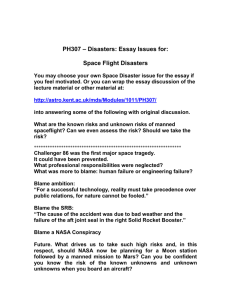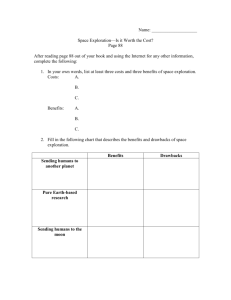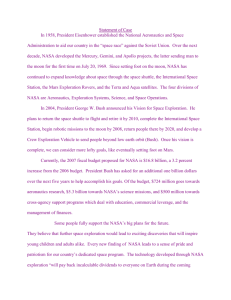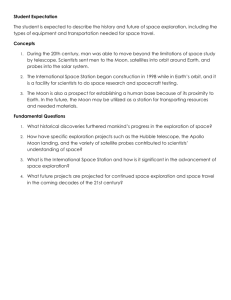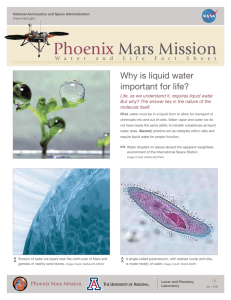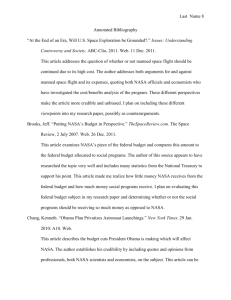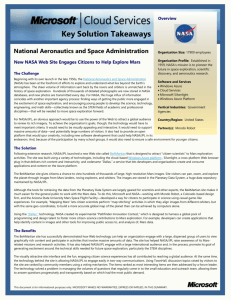Space Exploration
advertisement
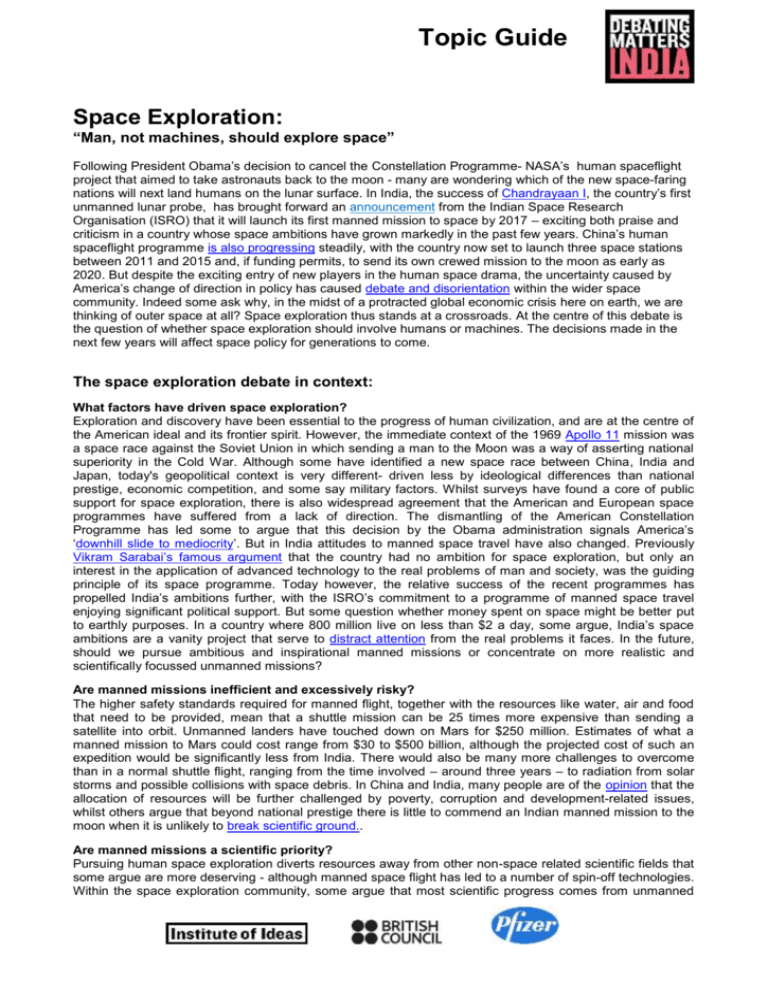
Topic Guide Space Exploration: “Man, not machines, should explore space” Following President Obama’s decision to cancel the Constellation Programme- NASA’s human spaceflight project that aimed to take astronauts back to the moon - many are wondering which of the new space-faring nations will next land humans on the lunar surface. In India, the success of Chandrayaan I, the country’s first unmanned lunar probe, has brought forward an announcement from the Indian Space Research Organisation (ISRO) that it will launch its first manned mission to space by 2017 – exciting both praise and criticism in a country whose space ambitions have grown markedly in the past few years. China’s human spaceflight programme is also progressing steadily, with the country now set to launch three space stations between 2011 and 2015 and, if funding permits, to send its own crewed mission to the moon as early as 2020. But despite the exciting entry of new players in the human space drama, the uncertainty caused by America’s change of direction in policy has caused debate and disorientation within the wider space community. Indeed some ask why, in the midst of a protracted global economic crisis here on earth, we are thinking of outer space at all? Space exploration thus stands at a crossroads. At the centre of this debate is the question of whether space exploration should involve humans or machines. The decisions made in the next few years will affect space policy for generations to come. The space exploration debate in context: What factors have driven space exploration? Exploration and discovery have been essential to the progress of human civilization, and are at the centre of the American ideal and its frontier spirit. However, the immediate context of the 1969 Apollo 11 mission was a space race against the Soviet Union in which sending a man to the Moon was a way of asserting national superiority in the Cold War. Although some have identified a new space race between China, India and Japan, today's geopolitical context is very different- driven less by ideological differences than national prestige, economic competition, and some say military factors. Whilst surveys have found a core of public support for space exploration, there is also widespread agreement that the American and European space programmes have suffered from a lack of direction. The dismantling of the American Constellation Programme has led some to argue that this decision by the Obama administration signals America’s ‘downhill slide to mediocrity’. But in India attitudes to manned space travel have also changed. Previously Vikram Sarabai’s famous argument that the country had no ambition for space exploration, but only an interest in the application of advanced technology to the real problems of man and society, was the guiding principle of its space programme. Today however, the relative success of the recent programmes has propelled India’s ambitions further, with the ISRO’s commitment to a programme of manned space travel enjoying significant political support. But some question whether money spent on space might be better put to earthly purposes. In a country where 800 million live on less than $2 a day, some argue, India’s space ambitions are a vanity project that serve to distract attention from the real problems it faces. In the future, should we pursue ambitious and inspirational manned missions or concentrate on more realistic and scientifically focussed unmanned missions? Are manned missions inefficient and excessively risky? The higher safety standards required for manned flight, together with the resources like water, air and food that need to be provided, mean that a shuttle mission can be 25 times more expensive than sending a satellite into orbit. Unmanned landers have touched down on Mars for $250 million. Estimates of what a manned mission to Mars could cost range from $30 to $500 billion, although the projected cost of such an expedition would be significantly less from India. There would also be many more challenges to overcome than in a normal shuttle flight, ranging from the time involved – around three years – to radiation from solar storms and possible collisions with space debris. In China and India, many people are of the opinion that the allocation of resources will be further challenged by poverty, corruption and development-related issues, whilst others argue that beyond national prestige there is little to commend an Indian manned mission to the moon when it is unlikely to break scientific ground.. Are manned missions a scientific priority? Pursuing human space exploration diverts resources away from other non-space related scientific fields that some argue are more deserving - although manned space flight has led to a number of spin-off technologies. Within the space exploration community, some argue that most scientific progress comes from unmanned Topic Guide missions that focus on the most compelling and answerable scientific questions. Historically, India’s interest in space has always rested on the economic and social development of the country, its notable successes now making it a world leader in remote sensing and telecommunications. If one thinks of the most exciting recent developments in space science – the Hubble Space Telescope, the comet probe Deep Impact, the Cassini-Huygens mission to Saturn – they are all unmanned projects. In early 2006, scientists were excited by the return of the Stardust capsule with samples of cometary dust, the New Horizons mission saw a probe launched to Pluto, and Chandrayaan-1 found evidence of large quantities of water on the moon’s surface. But the ISRO’s commitment to a manned mission to the moon not only signals a shift in direction, but also appears to be propelled by an altogether different imperative – to ‘take leadership of manned spaceflight’ and improve India’s standing in the world. Should resources be concentrated on bolstering niche expertise rather than ambitious lunar programmes that re-invent the wheel? Why send humans to space? For advocates of human space exploration the debate goes beyond science, and the issue of whether robots could replace humans in performing scientific experiments, and involves what the scientific impulse says about humanity. A Mars mission, for example, would be a statement of the value of human civilization, something that is valuable in itself rather than for the scientific discoveries that it produces. It represents the sort of challenge that a society requires in order to advance and is part of humanity’s progress towards becoming a multi-planet space-faring species. Some see the fact we have failed to continue pushing forward the boundaries of human space exploration as a sign that we have given up on reaching for the stars. One giant leap backwards for mankind? Is manned space flight and the desire to ‘boldly go’ into the unknown a heroic symbol of human aspiration in a world that has become obsessively concerned with eliminating all possible risks? Or is it rather the case that these ideas are outdated, that we should look for romance elsewhere and that seeking to recapture the spirit of exploration would interfere with scientific priorities? Should China, India , Japan, Brazil, Taiwan, the Koreas, Kenya or any country with ambitions in space, learn from the mistakes of the Cold War space race and stake their prestige on something more tangible and cost-effective? Does manned space flight still inspire the public, or, by continuing to pursue it despite the dangers, do we risk discrediting the entire space programme? Topic Guide Essential reading: The pull of gravity Clive Cookson Financial Times 18 March 2010 http://www.ft.com/cms/s/0/d911bd8a-322d-11df-b4e2-00144feabdc0.html Debating manned moon missions Kenneth R Fletcher Smithsonian Magazine July 2008 http://www.smithsonianmag.com/science-nature/moon-mission.html?c=y&page=1 India’s Space Program Vincent G. Sabathier and G. Ryan Faith Center for Strategic and International Studies 25 January 2008 http://www.csis.org/media/csis/pubs/080125_sabathier.pdf For Getting India into Orbit Saswato R Das Times of India 13 May 2010 http://timesofindia.indiatimes.com/articleshow/5922317.cms?prtpage=1 To boldly go Editorial Times of India 23 July 2009 http://timesofindia.indiatimes.com/articleshow/4799594.cms?prtpage=1 India should be reaching for the stars Stuart Simpson The Times 13 October 2008 http://www.timesonline.co.uk/tol/comment/specials/article4936172.ece Is space exploration worth the cost? David Livingston Space Review 21 January 2008 http://www.thespacereview.com/article/1040/1 India's Space Agency Proposes Manned Spaceflight Program K.S. Jayaraman Space.com 10 November 2006 http://www.space.com/news/061110_india_mannedspace.html Retreating from the final frontier Henry Joy McCracken Spiked 03 August 2005 http://www.spiked-online.com/Articles/0000000CACD4.htm The human explorer Robert Zubrin The New Atlantis 05 February 2004 http://www.thenewatlantis.com/archive/4/zubrin.htm Against New Moon Rising: America Abandons Manned Lunar Missions, India Embraces Them Jeremy Kahn The Faster Times 1 February 2010 http://thefastertimes.com/india/2010/02/01/new-moon-rising-america-abandons-manned-lunar-missionsindia-embraces-them/ India’s moon mission Raghu Political Affairs Magazine 27 October 2008 http://www.politicalaffairs.net/article/articleview/7637/ An interview with Steven Weinberg Sam Dinkin Space Review 14 January 2008 http://www.thespacereview.com/article/1037/1 Let’s forget Nasa’s fancy ideas Martin Rees The Times 14 February 2008 http://www.timesonline.co.uk/tol/comment/columnists/guest_contributors/article3365566.ece India's small step into space Peter Bond The Independent 27 September 2006 http://www.independent.co.uk/news/science/indias-small-step-into-space-417736.html Nasa and its small, sideways step for mankind Tim Hames The Times 08 August 2005 http://www.timesonline.co.uk/article/0,,1070-1726288,00.html Topic Guide The virtual astronaut Robert Park The New Atlantis 05 February 2004 http://www.thenewatlantis.com/archive/4/park.htm Further reading: Lost in Space Michael Hanlon Blog Dail Mail 31 May 2010 http://hanlonblog.dailymail.co.uk/2010/05/lost-in-space.html Stephen Hawkings: The Future of Space – Manned vs Robotic Missions? Casey Kazan The Daily Galaxy 7 March 2010 http://www.dailygalaxy.com/my_weblog/2010/03/stephen-hawking-the-future-of-space-manned-vs-roboticmissions-a-weekend-feature.html The Real Space Race Is In Asia Mary Hennock Newsweek 20 September 2008 http://www.newsweek.com/2008/09/19/the-real-space-race-is-in-asia.print.html Indian Space Research Organization http://www.isro.org Key terms: Chandrayaan I http://www.isro.org/satellites/chandrayaan-1.aspx Hubble Space Telescope http://hubblesite.org/ International Space Station http://www.nasa.gov/mission_pages/station/main/index.html NASA http://en.wikipedia.org/wiki/NASA Topic Guide Resources: Space exploration BBC News http://www.bbc.co.uk/science/space/exploration/index.shtml Exploring Mars BBC News In Depth http://news.bbc.co.uk/1/hi/in_depth/sci_tech/2003/race_for_mars/default.stm New Scientist Space New Scientist http://www.newscientist.com/section/space President Obama’s vision for space exploration Part 1 G. Ryan Faith The Space Review 19 April 2010 http://www.thespacereview.com/article/1610/1 President Obama’s vision for space exploration Part 2 G. Ryan Faith The Space Review 26 April 2010 http://www.thespacereview.com/article/1616/1 The Future of Human Spaceflight Space, Policy, and Society Research Group Massachusetts Institute of Technology December 2008 http://web.mit.edu/mitsps/MITFutureofHumanSpaceflight.pdf Explore the Solar System BBC http://www.bbc.co.uk/solarsystem/ Remembering the human cost of exploring space CNN Crossfire Transcript 04 February 2003 http://transcripts.cnn.com/TRANSCRIPTS/0302/04/cf.00.html Space exploration special report Guardian http://www.guardian.co.uk/space/interactive/0,15710,1392183,00.html The Mars Society http://www.marssociety.org/ Why we explore Stephen J Dick NASA 14 October 2004 http://www.nasa.gov/missions/solarsystem/Why_We_01pt1.html The vision for space exploration NASA February 2004 (pdf) http://www.nasa.gov/pdf/55583main_vision_space_exploration2.pdf SPACE.com http://www.space.com/ Manned space missions Apollo 11 mission http://spaceflight.nasa.gov/history/apollo/apollo11/index.html Discovery mission http://www.nasa.gov/returntoflight/main/index.html Space Shuttle Columbia http://www.nasa.gov/columbia/home/ Shenzhou http://en.wikipedia.org/wiki/Shenzhou_7 Orion http://en.wikipedia.org/wiki/Orion_(spacecraft) Unmanned space missions Chandayaan I http://en.wikipedia.org/wiki/Chandrayaan-1 Chandayaan II http://en.wikipedia.org/wiki/Chandrayaan-2 Phoenix Mars Lander http://en.wikipedia.org/wiki/Phoenix_(spacecraft) Cassini-Huygens http://saturn.jpl.nasa.gov/home/index.cfm Deep Impact http://deepimpact.jpl.nasa.gov/mission/ Galileo http://galileo.jpl.nasa.gov/ Mars Reconnaissance Orbiter http://mpfwww.jpl.nasa.gov/mro/ New horizons http://www.nasa.gov/mission_pages/newhorizons/main/index.html Stardust http://stardust.jpl.nasa.gov/home/index.html Topic Guide In the news: Veteran astronaut begs NASA to keep old shuttle Guardian 21 June 2010 http://www.guardian.co.uk/science/2010/jun/21/astronaut-criticises-nasa-shuttle-plan Future of manned space flight ABC Net10 June 2010 http://www.abc.net.au/unleashed/stories/s2922920.htm Indian space project in disarray after a series of setbacks The National 1 June 2010 http://www.thenational.ae/apps/pbcs.dll/article?AID=/20100602/FOREIGN/706019954/1002/FOREIGN Shuttle Atlantis completes its last mission The Hindu 26 May 2010 http://beta.thehindu.com/sci-tech/article439051.ece Barack Obama unveils new vision for Nasa space flight Guardian 15 April 2010 http://www.guardian.co.uk/technology/2010/apr/15/barack-obama-nasa-space-programme India set to launch manned mission, says ISRO Chairman NDTV 14 April 2010 http://www.ndtv.com/news/india/india-set-to-launch-manned-mission-says-isro-chairman-20004.php Ice deposits found on moon’s pole BBC News 2 March 2010 http://news.bbc.co.uk/1/hi/sci/tech/8544635.stm Politicians’ fight to keep America’s moon mission alive Guardian 1 February 2010 http://www.guardian.co.uk/world/2010/feb/01/moon-mission-obama-budget Virgin unveils SpaceShipTwo for tourists Guardian 27 December 2009 http://www.guardian.co.uk/world/gallery/2009/dec/07/virgin-richard-branson-global-flyer Russia launches manned spacecraft to ISS China Daily 21 December 2009 http://www.chinadaily.com.cn/world/2009-12/21/content_9206698.htm Underfunding shackles Nasa vision BBC News 9 September 2009 http://news.bbc.co.uk/1/hi/sci/tech/8245409.stm Nation strives to launch labs China Daily 1 September 2009 http://www.chinadaily.com.cn/cndy/2009-09/01/content_8638731.htm ISRO planning mission to Mars The Hindu 31 August 2009 http://beta.thehindu.com/news/national/article12300.ece A new space race Guardian 24 February 2009 http://www.guardian.co.uk/science/2009/feb/24/the-new-space-race Countdown to moon mission begins Times of India 20 October 2008 http://timesofindia.indiatimes.com/India/Moon_mission_Countdown_begins/articleshow/3617544.cms China's first spacewalk team feted with parade Gillian Wong Associated Press 30 September 2008 http://ap.google.com/article/ALeqM5jszhZZpw8KvbElApGPkWEikezcBAD93G5CO00 Asia’s race for space MWC news 29 September 2008 http://mwcnews.net/content/view/25557/0/ Water found on Mars, Nasa scientists confirm Daily Telegraph 31 July 2008 http://www.telegraph.co.uk/earth/main.jhtml?xml=/earth/2008/06/22/scinasa122.xml Nasa will struggle when shuttle retires says boss Guardian 26 July 2008 http://www.guardian.co.uk/science/2008/jul/26/spaceexploration.spacetechnology Scientists plan to bring back rocks – and perhaps even life – from Mars Guardian 14 July 2008 http://www.guardian.co.uk/science/2008/jul/14/mars.spaceexploration
